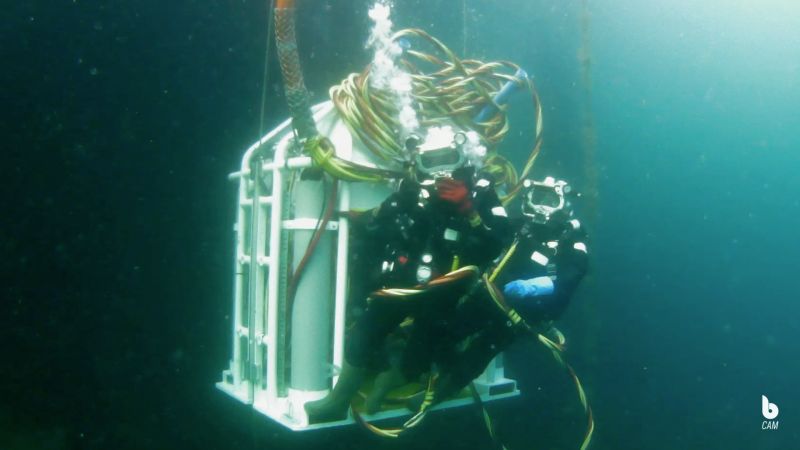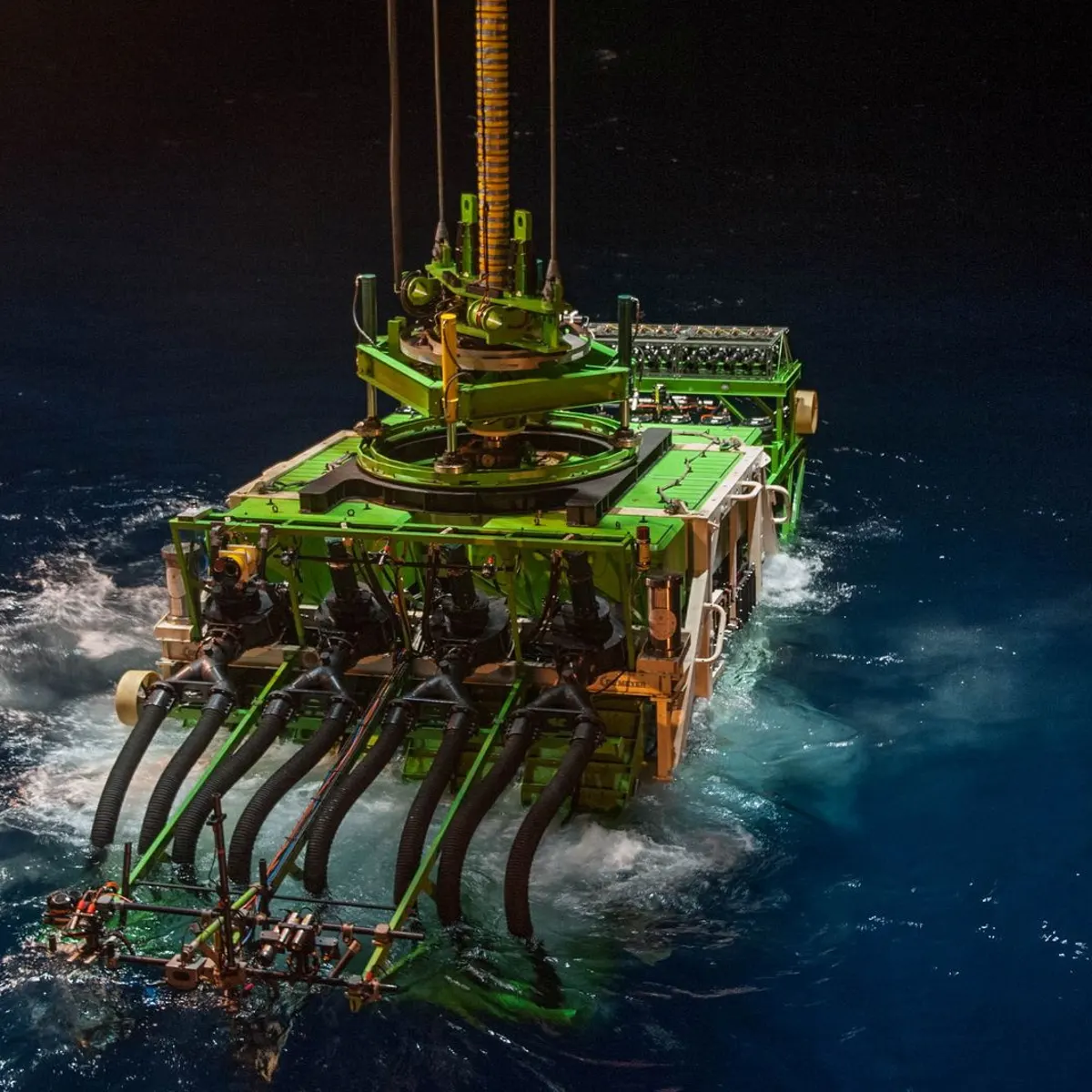Norway’s Deep Dive: Exploring the Riches and Risks of Deep-Sea Mining
The majestic fjords of Norway have long captured the world’s imagination with their breathtaking beauty and pristine waters. But beneath the tranquil surface lies a new frontier, one shrouded in mystery and controversy: the deep ocean floor. Norway is poised to become the first country in the world to venture into this uncharted territory by allowing commercial deep-sea mining.

A Treasure Trove in the Depths
The seabed around Norway holds a treasure trove of minerals, particularly rare earth elements (REEs) vital for modern technology, from smartphones to electric vehicles. These minerals are crucial for the green transition, fueling concerns about dependence on China, the current dominant supplier. Extracting these resources from the depths promises economic gain and a secure supply chain for Europe.
However, venturing into the abyss comes with inherent risks. Critics of deep-sea mining raise concerns about the potential environmental impact:
- Disturbing delicate ecosystems: Mining operations could disrupt fragile deep-sea habitats, harming creatures adapted to extreme environments and potentially wiping out undiscovered species.
- Sediment plumes: Extracting minerals and processing them aboard ships can create plumes of sediment that could suffocate organisms and pollute the water column.
- Noise pollution: Mining equipment generates loud noises that can disrupt underwater communication and navigation for marine life.
- Unforeseen consequences: The long-term impact of disturbing the deep-sea floor remains largely unknown, potentially triggering unpredictable ecological changes.
A Dilemma at the Crossroads
The Norwegian government faces a difficult choice. Allowing deep-sea mining could boost the economy and secure critical resources, but at the cost of potentially jeopardizing the health of the delicate marine ecosystem. The decision has sparked heated debate, with scientists, environmental groups, and even some within the fishing industry voicing concerns.

Navigating the Unknown
Norway is taking steps to mitigate potential risks. Strict environmental regulations and monitoring are planned, with companies required to demonstrate minimal impact on the ecosystem. However, critics argue that current knowledge about the deep sea is insufficient to predict the full range of consequences. They call for a cautious approach, prioritizing thorough research and ensuring robust regulations before diving into commercial mining.
A Global Conversation
Norway’s decision has reignited the global conversation about deep-sea mining. Other countries with similar mineral deposits are watching closely, while international bodies grapple with the need for robust international regulations to govern this nascent industry. Finding a balance between economic benefit and environmental responsibility is crucial for ensuring responsible and sustainable use of the ocean’s hidden resources.
The future of deep-sea mining in Norway, and across the globe, remains uncertain. The path forward will require careful consideration of the potential benefits and risks, prioritizing long-term sustainability and safeguarding the delicate ecosystems that lie hidden beneath the waves.






Xledbs
stromectol pharmacy – tegretol 200mg brand carbamazepine 200mg ca
January 2, 2025Xfxdcc
purchase isotretinoin without prescription – isotretinoin 10mg oral brand linezolid 600mg
January 18, 2025Uhzjmn
amoxil cost – buy generic combivent 100mcg ipratropium 100 mcg cost
January 18, 2025Abgpfa
azithromycin 250mg over the counter – cost bystolic 20mg nebivolol brand
February 1, 2025Lwsskq
prednisolone pills – buy prednisolone 20mg purchase prometrium pill
February 2, 2025Lywbmj
buy lasix online cheap – purchase betamethasone sale3 buy betamethasone 20 gm
February 10, 2025Kywgut
buy augmentin 375mg without prescription – purchase cymbalta pill duloxetine 40mg pills
February 15, 2025Fdrbqc
vibra-tabs pills – glucotrol 10mg sale glipizide 5mg pill
February 16, 2025Hdjlur
oral clavulanate – order generic nizoral cymbalta pill
February 23, 2025Chutxd
semaglutide over the counter – order semaglutide 14mg pills buy cyproheptadine no prescription
February 25, 2025Zvtznp
order tizanidine 2mg online cheap – cost microzide 25mg where can i buy hydrochlorothiazide
February 28, 2025Ankuga
cialis 40mg uk – buy tadalafil 20mg pill buy viagra sale
March 6, 2025Bvmyir
buy sildenafil 100mg – order cialis 5mg pill cialis 10mg brand
March 8, 2025Ebspyf
buy lipitor 20mg generic – purchase amlodipine generic zestril 2.5mg
March 15, 2025Yjdxwc
cenforce 50mg uk – cenforce drug metformin over the counter
March 16, 2025Bndmql
atorvastatin 80mg cheap – buy zestril for sale buy zestril 2.5mg
March 17, 2025Glufjt
order omeprazole – buy lopressor 100mg order tenormin 50mg pill
March 21, 2025Qlfrog
purchase medrol pills – pregabalin over the counter order generic aristocort 4mg
March 27, 2025Aiwxka
clarinex tablet – desloratadine oral priligy 30mg without prescription
March 29, 2025Zbhokj
buy generic misoprostol 200mcg – order cytotec sale buy cheap diltiazem
March 31, 2025Kizljy
order acyclovir – oral allopurinol 300mg order crestor 10mg
April 6, 2025Otzypz
buy generic domperidone over the counter – flexeril 15mg drug flexeril 15mg pill
April 8, 2025Thelqz
motilium 10mg pill – order motilium 10mg online cheap flexeril us
April 15, 2025Kgqtam
buy inderal 10mg without prescription – methotrexate 10mg sale order methotrexate 10mg generic
April 17, 2025Rjudzt
coumadin 2mg uk – where to buy coumadin without a prescription order hyzaar online cheap
April 20, 2025Sapjjt
buy levaquin generic – order ranitidine 150mg for sale buy zantac online cheap
April 24, 2025Eshbwj
buy cheap esomeprazole – buy esomeprazole 40mg without prescription sumatriptan for sale online
April 24, 2025Aedxui
order mobic 7.5mg generic – celebrex medication tamsulosin 0.4mg ca
April 30, 2025Tonorh
buy cheap generic zofran – zocor us simvastatin generic
May 17, 2025Nuorde
valtrex 500mg pill – valtrex usa fluconazole 200mg oral
May 18, 2025qqbmj
provigil us provigil 100mg brand cost modafinil 100mg buy generic provigil 200mg modafinil 200mg for sale oral provigil order provigil 200mg pill
June 2, 2025vm6m7
order clomid without insurance clomiphene costo where to buy cheap clomiphene tablets buy cheap clomiphene pill can you get clomiphene for sale cost generic clomiphene pills get clomiphene for sale
June 4, 2025can you buy cialis over the counter in canada
More articles like this would make the blogosphere richer.
June 9, 2025cialis 5 mg for the best price
I couldn’t turn down commenting. Well written!
June 9, 2025what flagyl is used for
More peace pieces like this would make the web better.
June 11, 2025flagyl bacterial vaginosis
More posts like this would make the blogosphere more useful.
June 11, 2025zanbq
buy zithromax cheap – zithromax for sale order metronidazole for sale
June 12, 2025le1as
azithromycin 250mg pills – order ofloxacin 400mg pill flagyl 200mg pills
June 13, 2025